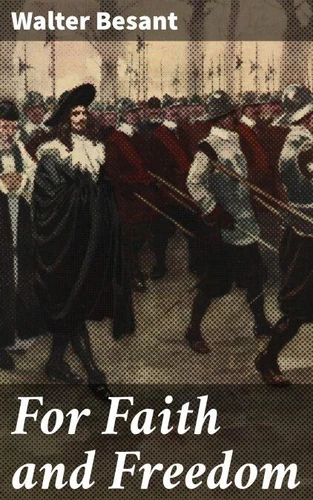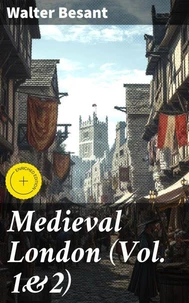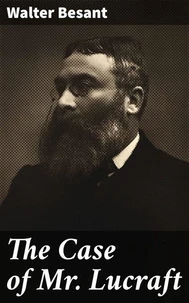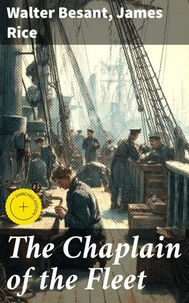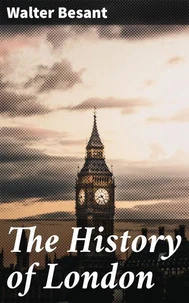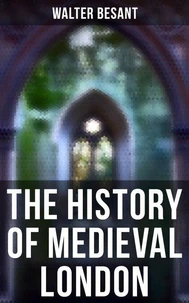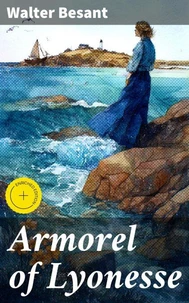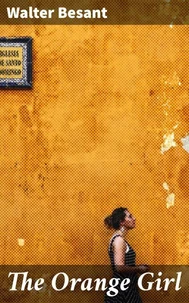For Faith and Freedom. A Tale of Resilience, Defiance, and Religious Persecution in 16th Century France
Par :Formats :
Disponible dans votre compte client Decitre ou Furet du Nord dès validation de votre commande. Le format ePub est :
- Compatible avec une lecture sur My Vivlio (smartphone, tablette, ordinateur)
- Compatible avec une lecture sur liseuses Vivlio
- Pour les liseuses autres que Vivlio, vous devez utiliser le logiciel Adobe Digital Edition. Non compatible avec la lecture sur les liseuses Kindle, Remarkable et Sony
 , qui est-ce ?
, qui est-ce ?Notre partenaire de plateforme de lecture numérique où vous retrouverez l'ensemble de vos ebooks gratuitement
Pour en savoir plus sur nos ebooks, consultez notre aide en ligne ici
- Nombre de pages415
- FormatePub
- ISBN406-4-06-621798-3
- EAN4064066217983
- Date de parution19/05/2021
- Protection num.Digital Watermarking
- Taille2 Mo
- Infos supplémentairesepub
- ÉditeurGOOD PRESS
Résumé
In "For Faith and Freedom, " Walter Besant intricately weaves a compelling narrative set against the backdrop of the tumultuous Reformation. This historical novel showcases Besant's ability to blend rich character development with vivid depictions of 16th-century England, exploring themes of belief, identity, and personal sacrifice. The prose is marked by a lyrical quality, reflective of the Victorian era'Äôs moral complexity while presenting the clash of faith and freedom that defined the period.
Besant's meticulous attention to historical detail and context serves as both a mirror and commentary on the struggles of his time, inviting readers to engage with the moral dilemmas faced by individuals torn between religious conviction and personal agency. Walter Besant, a prominent figure in the late 19th-century literary scene, was not only a novelist but also a historian and social reformer. His deep engagement with the issues of social justice and human rights likely drew him to explore the narratives of those who stood for their convictions during a time when faith could lead to persecution.
Besant's background in the Church and his later liberal views on faith and politics provide a nuanced perspective that enriches the text, making it resonate with contemporary discussions on faith and freedom. This book is highly recommended for readers with an interest in historical fiction that delves into the personal and societal conflicts of belief systems. Besant'Äôs masterful storytelling, combined with his historical insights, renders "For Faith and Freedom" not just a novel but a reflection on the enduring human spirit in the quest for truth and autonomy.
It is a must-read for anyone interested in the interplay of faith, freedom, and the human experience.
Besant's meticulous attention to historical detail and context serves as both a mirror and commentary on the struggles of his time, inviting readers to engage with the moral dilemmas faced by individuals torn between religious conviction and personal agency. Walter Besant, a prominent figure in the late 19th-century literary scene, was not only a novelist but also a historian and social reformer. His deep engagement with the issues of social justice and human rights likely drew him to explore the narratives of those who stood for their convictions during a time when faith could lead to persecution.
Besant's background in the Church and his later liberal views on faith and politics provide a nuanced perspective that enriches the text, making it resonate with contemporary discussions on faith and freedom. This book is highly recommended for readers with an interest in historical fiction that delves into the personal and societal conflicts of belief systems. Besant'Äôs masterful storytelling, combined with his historical insights, renders "For Faith and Freedom" not just a novel but a reflection on the enduring human spirit in the quest for truth and autonomy.
It is a must-read for anyone interested in the interplay of faith, freedom, and the human experience.
In "For Faith and Freedom, " Walter Besant intricately weaves a compelling narrative set against the backdrop of the tumultuous Reformation. This historical novel showcases Besant's ability to blend rich character development with vivid depictions of 16th-century England, exploring themes of belief, identity, and personal sacrifice. The prose is marked by a lyrical quality, reflective of the Victorian era'Äôs moral complexity while presenting the clash of faith and freedom that defined the period.
Besant's meticulous attention to historical detail and context serves as both a mirror and commentary on the struggles of his time, inviting readers to engage with the moral dilemmas faced by individuals torn between religious conviction and personal agency. Walter Besant, a prominent figure in the late 19th-century literary scene, was not only a novelist but also a historian and social reformer. His deep engagement with the issues of social justice and human rights likely drew him to explore the narratives of those who stood for their convictions during a time when faith could lead to persecution.
Besant's background in the Church and his later liberal views on faith and politics provide a nuanced perspective that enriches the text, making it resonate with contemporary discussions on faith and freedom. This book is highly recommended for readers with an interest in historical fiction that delves into the personal and societal conflicts of belief systems. Besant'Äôs masterful storytelling, combined with his historical insights, renders "For Faith and Freedom" not just a novel but a reflection on the enduring human spirit in the quest for truth and autonomy.
It is a must-read for anyone interested in the interplay of faith, freedom, and the human experience.
Besant's meticulous attention to historical detail and context serves as both a mirror and commentary on the struggles of his time, inviting readers to engage with the moral dilemmas faced by individuals torn between religious conviction and personal agency. Walter Besant, a prominent figure in the late 19th-century literary scene, was not only a novelist but also a historian and social reformer. His deep engagement with the issues of social justice and human rights likely drew him to explore the narratives of those who stood for their convictions during a time when faith could lead to persecution.
Besant's background in the Church and his later liberal views on faith and politics provide a nuanced perspective that enriches the text, making it resonate with contemporary discussions on faith and freedom. This book is highly recommended for readers with an interest in historical fiction that delves into the personal and societal conflicts of belief systems. Besant'Äôs masterful storytelling, combined with his historical insights, renders "For Faith and Freedom" not just a novel but a reflection on the enduring human spirit in the quest for truth and autonomy.
It is a must-read for anyone interested in the interplay of faith, freedom, and the human experience.

